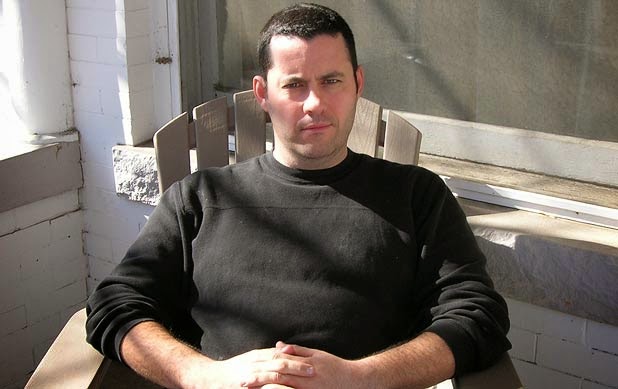Hard-drinking, drug-using, world-weary Sean Duffy is a Catholic Detective Inspector in the Royal Ulster Constabulary in Northern Ireland; he’s had “ten years of this shit.” He lives in a rough “Prod” neighborhood ruled by Bobby Cameron, the local paramilitary commander, a neighborhood so dangerous that Duffy has to check for bombs under his car each morning.
The book opens with a royal screw-up: a RUC-Gardai-FBI-M15-Interpol surveillance intended to catch five American gunrunners turns into a shoot-out. Duffy leaves the scene, thinking, “Fireworks behind.
Darkness ahead. And if that’s not a metaphor for the Irish Question I don’t know what is.” But this is only the beginning. “I didn’t foresee problems and maybe even Mystic Meg couldn’t have predicted the epic shitstorm that was heading our way across the cold grey waters of the Irish Sea.”
“Fireworks behind. Darkness ahead. And if that’s not a metaphor for the Irish Question I don’t know what is.”
Shortly thereafter, he’s called to the scene of a double murder. A wealthy couple has been shot in their home and their son is missing. The son’s body is found at the bottom of a cliff and there’s a suicide note. It seems like an open-and-shut case but Duffy isn’t satisfied.
It’s difficult, if not impossible, to talk about the plot without spoiling the fun. But, here’s what McKinty himself says in an afterword which will give you an idea of its complexities:
This is a work of fiction and any resemblance to any person living or dead is entirely coincidental. That being said, observant readers will have noticed that I have borrowed several elements from several real historical incidents of the time period: the tragic death of Olivia Channon at Oxford; Lt. Col. Oliver North’s bizarre attempt to obtain anti-aircraft missiles using an Irish passport and the pseudonym John Clancy (borrowing the surname of his favorite spy novelist) during the Iran-Contra affair; the events surrounding the signing of the Anglo-Irish Agreement; the Chinook helicopter crash on the Mull of Kintyre in which an entire cadre of M15 agents based in Northern Ireland were killed; and the theft of Blowpipe and Javelin missiles from the Short Brothers factory in East Belfast.
DI Sean Duffy is pure Belfast noir. When his colleague, McCrabben and their new recruit, Lawson, talk of “justice,” Duffy responds, “You know there’s no such thing as justice.”
He’s a heavy drinker (often at breakfast):
McArthur took a gulp of his whiskey and I did the same. Twelve-year-old Islay. Good stuff if you liked peat, smoke, earth, rain, despair, and the Atlantic Ocean, and who doesn’t like that?
He’s a coke user who liberates a bag from the evidence locker and hides it in his shed along with the rest of his stash:
I remembered about the pharma coke, went outside, and nailed a line so pure it was like getting yelled at by God.
He resolves an incident at a high-class brothel involving a famous American actor and one of the girls. The madam invites him to come back any time ‘on the house’: “It was all completely illegal, of course, but the owners paid off at a level so elevated that you’d need a Sherpa to get close to them.”
After a notorious criminal is killed without confessing:
I kneeled under one of the forensic team arc lamps and tried to read the truth in Tommy’s cold blue eyes.
But there was no truth.
There was only death.
Always, there’s only death.
There was only death.
Always, there’s only death.
Throughout the novel, McKinty draws our attention to sound: we hear the sounds of the ocean, of gunfire, helicopters, voices and accents. A woman is described as having a “Derry accent that sounded like a cement mixer with gearbox trouble.” Another has a Cork accent that sounded like “a donkey falling into a well.”
And, always, there is music. The book’s title comes from the Tom Waite song on the Rain Dogs album and DI Duffy (who loves vinyl) selects and plays classical, jazz, experimental, pop tracks in virtually every scene. And, somewhere, Clarence Clemons is spinning in his grave. Duffy says:
The Cure’s “Close to Me” started replaying in my head. It would really be a much better song if they cut the saxophone. Most pop songs would be better without the saxophone. Bruce Springsteen’s works the prima facie case for this, and perhaps Live At The Harlem Square Club a rare counter-example.
Adrian McKinty has written sixteen crime and YA novels. The earlier books in the Sean Duffy series are THE COLD, COLD GROUND (2012), I HEAR THE SIRENS IN THE STREET (2013); and IN THE MORNING I’LL BE GONE (which won the Ned Kelly Award in 2014). The series was understood to be a trilogy but demand was apparently so great that McKinty was persuaded to write a fourth. Hopefully, there’ll be a fifth. And a sixth.



No comments:
Post a Comment